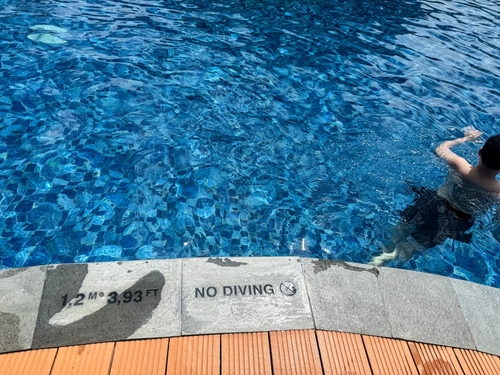Pool Deck Accidents: More Common Than You Think
Every year, thousands of Floridians suffer injuries from slipping on wet pool decks, with medical bills often exceeding $30,000 for serious injuries. If you’ve slipped and fallen on a pool deck at a hotel, apartment complex, or public facility, you’re likely dealing with painful injuries, mounting medical expenses, and questions about who’s responsible. The combination of water, smooth surfaces, and Florida’s year-round pool season creates perfect conditions for accidents. Understanding what evidence you need to prove your case can mean the difference between recovering full compensation and being left with overwhelming bills.
💡 Pro Tip: Take photos of the accident scene immediately, even with your phone – wet conditions dry quickly and crucial evidence can disappear within hours.
The Soffer Firm has been voted Super Lawyers "Rising Star" and "National Trial Lawyers – Top 40 Under 40" multiple years because of our dedication to clients. We work on a contingency basis, meaning we don’t get paid unless you do. Our track record includes millions recovered for our clients. Our Florida personal injury lawyers are here to guide you through your legal case. Contact us today at 305-503-5634.
Understanding Your Rights After a Pool Deck Slip and Fall
Florida Statute 768.0755 sets the foundation for slip and fall cases involving transitory foreign substances, requiring injured persons to prove that the business establishment had actual or constructive knowledge of the dangerous condition. For pool deck accidents, this means demonstrating that the property owner knew or should have known about the hazardous condition that caused your fall. A slip and fall lawyer in Miami can help you understand how constructive knowledge may be proven by circumstantial evidence showing either that the dangerous condition existed for such a length of time that the business should have discovered it through ordinary care, or that the condition occurred with regularity and was therefore foreseeable.
Property owners have specific duties under Florida Public Swimming Pool Rules to maintain safe conditions. Florida Administrative Code 64E-9.004 requires pool decks to be kept free from sediment, floating debris, visible dirt, and algae. Additionally, pool wet decks must be constructed of concrete or other nonabsorbent material with a smooth slip-resistant finish, and uniformly sloped away from the pool with a minimum 2 percent grade to prevent standing water. When these standards aren’t met, property owners may be liable for resulting injuries.
💡 Pro Tip: Request incident reports from the property immediately – many facilities have internal policies requiring documentation of all accidents, and these reports often contain admissions about known hazards.
Building Your Case: A Step-by-Step Evidence Timeline
Time is critical in pool deck slip and fall cases. The statute of limitations for premises liability cases in Florida is 2 years from the date of injury, but evidence begins disappearing immediately. Working with a slip and fall lawyer in Miami ensures you capture crucial evidence before it’s lost. Here’s what you need to document at each stage:
- Immediately After the Fall: Photograph wet conditions, lack of warning signs, and any visible hazards like algae or debris. Report the incident to management and get witness contact information.
- Within 24-48 Hours: Seek medical treatment and document all injuries. Request surveillance footage from the property – Florida law doesn’t require them to preserve it without formal notice.
- First Week: Document your injuries with photos, keep all medical records, and start a pain journal. File an incident report with the property’s insurance company.
- First Month: Gather evidence of the property’s maintenance history and any prior accidents. Your attorney can request records showing how often the pool deck was cleaned and inspected.
- Ongoing: Track all medical expenses, lost wages, and how injuries impact your daily life. Under Florida’s pure comparative negligence system, your percentage of fault reduces your total damages recovery, so documenting the property’s negligence is crucial.
💡 Pro Tip: Save your shoes and clothing from the accident – slip-resistant soles can counter claims that you were wearing inappropriate footwear.
How The Soffer Firm Builds Winning Pool Deck Cases
Winning a pool deck slip and fall case requires more than just proving you fell – you need evidence establishing the property owner’s negligence. The Soffer Firm understands the specific challenges of these cases and knows how to counter common defense tactics. Property owners often claim they had no knowledge of dangerous conditions or that victims were comparatively negligent. Our approach involves thoroughly investigating maintenance records, interviewing staff about cleaning procedures, and working with experts to demonstrate how proper pool deck maintenance could have prevented your accident. A slip and fall lawyer in Miami from our firm will help prove constructive knowledge by showing the dangerous condition existed long enough that reasonable inspection would have discovered it.
💡 Pro Tip: Don’t give recorded statements to insurance companies without legal representation – they often use your words to minimize their client’s liability.
Critical Evidence That Proves Liability in Pool Deck Cases
Surveillance footage stands as the most powerful evidence in pool deck accident cases, often showing exactly how long water accumulated or debris remained on the deck. However, property owners aren’t required to preserve footage unless formally notified, making immediate action essential. Beyond video evidence, maintenance logs reveal cleaning schedules and whether staff followed required protocols. Florida requires pool operators to maintain detailed records of daily inspections and cleaning, which your slip and fall lawyer in Miami can subpoena to show negligent maintenance patterns.
Documentation That Strengthens Your Claim
Medical records linking your injuries directly to the fall provide the foundation for damage calculations. Emergency room reports noting "patient states fell on wet pool deck" create contemporaneous evidence that’s hard to dispute. We often see insurance companies challenge the severity of injuries, but detailed medical documentation, including MRI results showing torn ligaments or fractures, proves the serious nature of pool deck accidents. Additionally, witness statements from other pool users who noticed hazardous conditions or lack of warning signs can establish that dangers were obvious enough that staff should have addressed them.
💡 Pro Tip: Ask witnesses if they’ve seen similar conditions before – regular occurrence of hazards proves the property owner should have anticipated and prevented the danger.
Common Pool Deck Hazards and Property Owner Responsibilities
Understanding specific hazards helps build stronger cases. All glass containers and products are prohibited in fenced pool areas or within 50 feet of unfenced pools under Florida law, yet many facilities fail to enforce this rule. Broken glass creates invisible dangers on wet surfaces. Similarly, food and beverages are prohibited in pool and wet deck areas except for plastic water bottles, as spills create slip hazards. When properties allow these violations, they demonstrate negligent supervision that strengthens your claim.
Maintenance Standards and Building Code Violations
Pool wet decks must meet specific construction standards, including slip-resistant finishes installed according to manufacturer specifications. Wooden decks and walkways are prohibited in wet deck areas, defined as the 4-foot-wide unobstructed area around the pool perimeter. When properties cut corners on maintenance or construction, they create unreasonably dangerous conditions. A slip and fall lawyer in Miami can work with engineering experts to show how code violations or improper maintenance directly caused your accident. Property owners who allow pool surfaces to deteriorate until they cannot be maintained in safe condition must refinish them – failure to do so constitutes negligence.
💡 Pro Tip: Check online reviews for the property – previous complaints about slippery pool decks establish the owner’s knowledge of dangerous conditions.
Frequently Asked Questions
Understanding Pool Deck Accident Claims
Many accident victims worry about the complexity of proving their case or whether their injuries are "serious enough" to pursue compensation. Florida law protects your right to seek damages for any injury caused by another’s negligence, regardless of severity.
💡 Pro Tip: Document everything, even minor injuries – soft tissue damage often worsens over time and initial medical records establish the connection to your fall.
Legal Process and Next Steps
Understanding the legal process helps reduce anxiety about pursuing your claim. Most pool deck accident cases settle without trial, but having an attorney who’s prepared to go to court often results in better settlement offers.
💡 Pro Tip: Start your claim quickly – insurance companies often interpret delays as evidence that injuries weren’t serious.
1. What if the property owner claims they put up "Wet Floor" signs?
Warning signs don’t automatically absolve property owners of liability. The signs must be adequately placed, visible, and sufficient for the specific hazard. If the dangerous condition extends beyond the warned area or the hazard is more severe than a typical wet floor, property owners remain liable. Additionally, permanent hazards like improperly sloped decks or deteriorating surfaces require more than temporary signage.
2. How long do property owners have to clean up water around pools?
While Florida law doesn’t specify exact timeframes, courts consider what’s reasonable under the circumstances. During pool operating hours, staff should regularly inspect and address hazards. Evidence that water accumulated for 20-30 minutes without attention often establishes constructive knowledge. The frequency of inspections should increase during busy periods or rainy weather.
3. Can I still recover damages if I was barefoot on the pool deck?
Yes, being barefoot is expected and appropriate around pools. Property owners must maintain surfaces safe for barefoot traffic. In fact, many facilities require removing shoes in pool areas. Your lack of footwear cannot be used against you when the property failed to maintain slip-resistant surfaces as required by Florida building codes.
4. What damages can I recover in a pool deck slip and fall case?
You can seek compensation for medical expenses (past and future), lost wages, pain and suffering, and any permanent impairment. In cases involving hotels or resorts in the Miami Beach area, you might also recover costs for ruined vacations or cancelled plans. The amount depends on injury severity and the strength of liability evidence.
5. Should I accept the property’s insurance company’s first settlement offer?
Initial offers rarely reflect your case’s full value. Insurance companies often make quick, low offers hoping victims will accept before understanding their injuries’ extent. Consult with an attorney before accepting any settlement – once you sign, you cannot seek additional compensation even if injuries worsen.
Work with a Trusted Slip and Fall Lawyer
Pool deck accidents often result in serious injuries requiring extensive medical treatment and time away from work. Property owners and their insurance companies have teams of lawyers working to minimize their liability. You need experienced legal representation to level the playing field and ensure you receive fair compensation. Whether your accident happened at a downtown Miami hotel or a suburban apartment complex, the evidence you gather and how you present it makes all the difference in your case’s outcome.
The Soffer Firm has been voted Super Lawyers "Rising Star" and "National Trial Lawyers – Top 40 Under 40" multiple years because of our dedication to clients. We work on a contingency basis, meaning we don’t get paid unless you do. Our track record includes millions recovered for our clients. Our Florida personal injury lawyers are here to guide you through your legal case. Contact us today at 305-503-5634.

